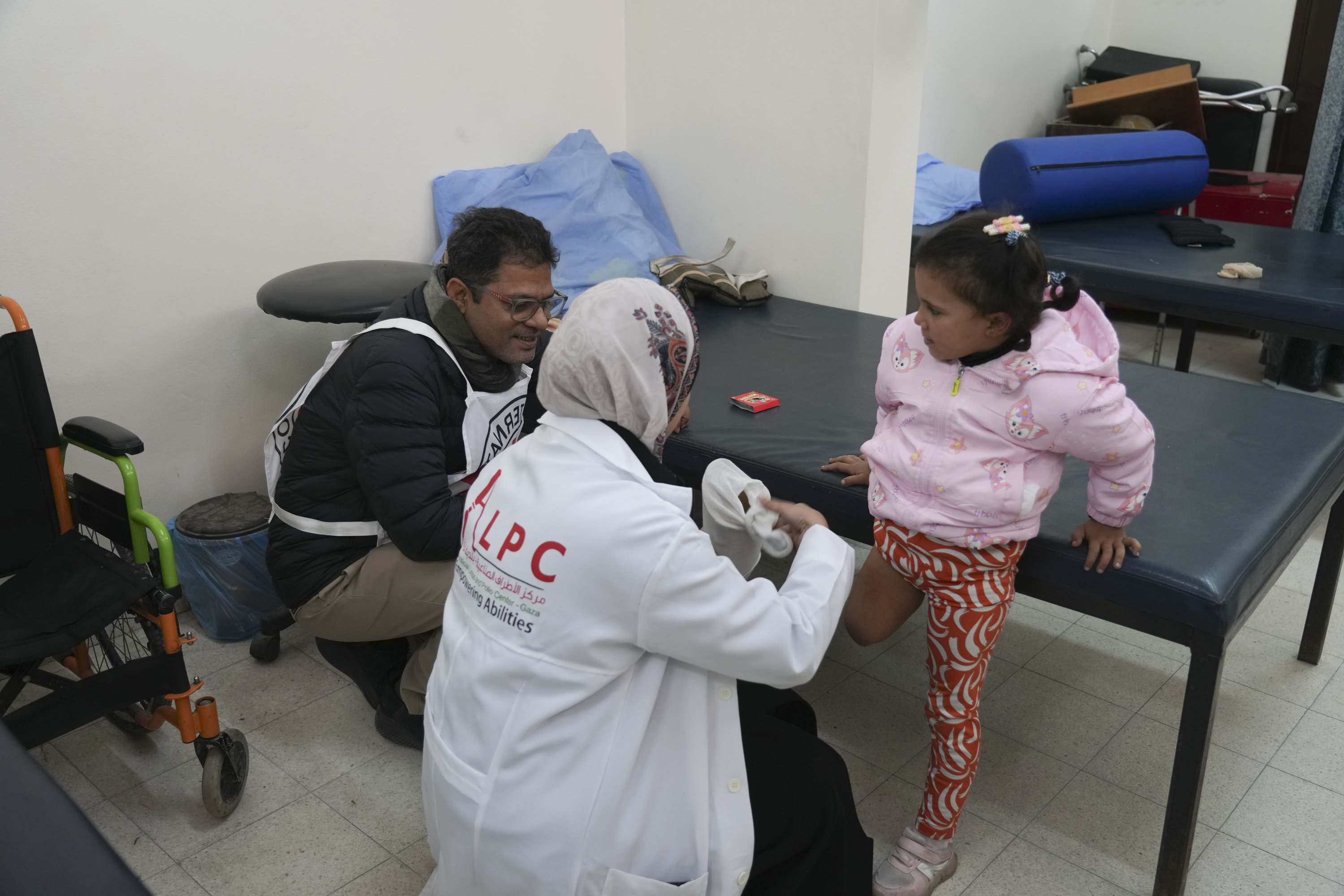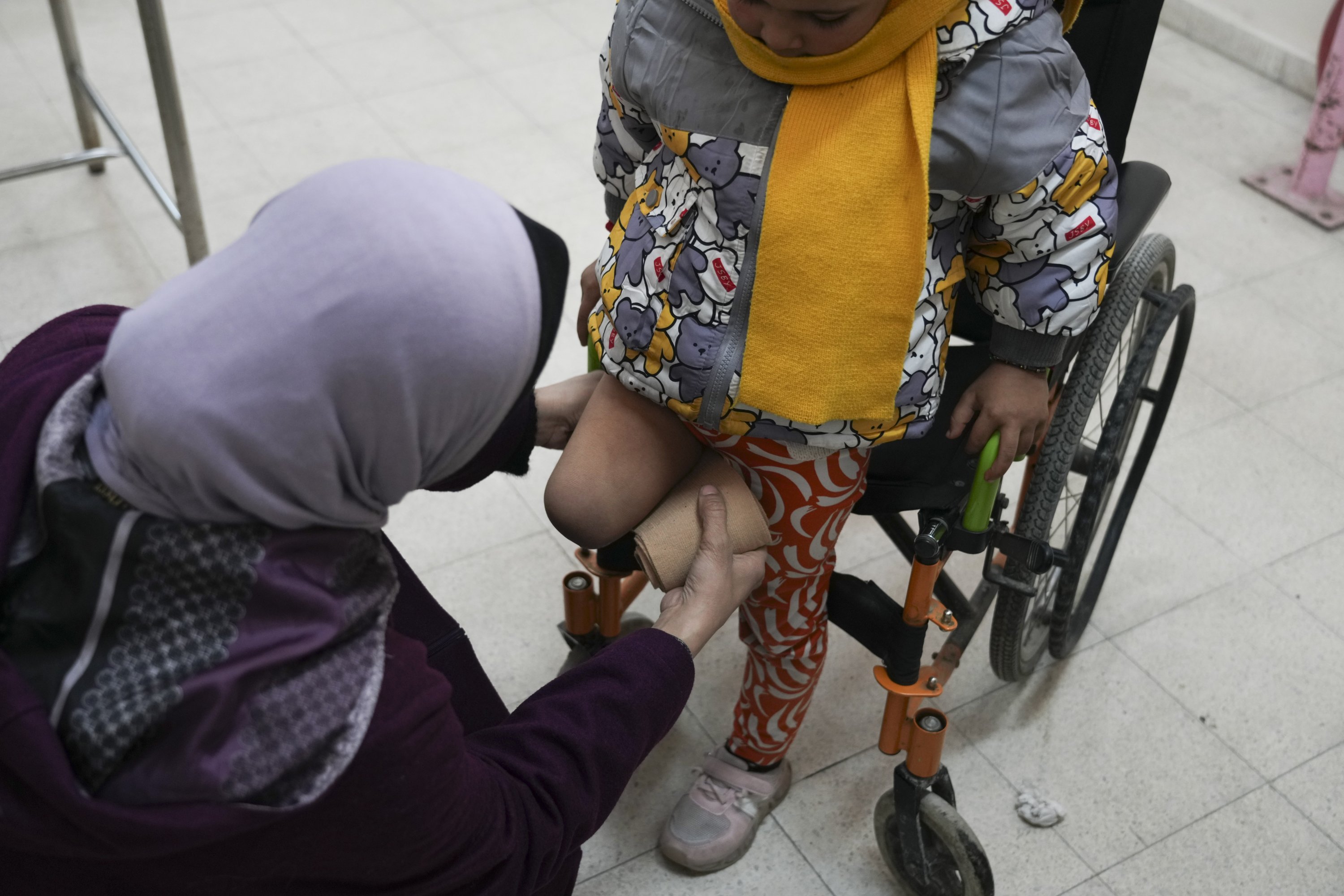© Turkuvaz Haberleşme ve Yayıncılık 2026
Five-year-old Sila Abu Aqlan took her first steps with a prosthetic leg in Gaza City, concentrating hard as her new pink sneakers with lacy frills moved with each cautious step.
It has been 15 months since Sila’s leg was amputated after a severe burn from an Israeli airstrike that killed her family.
Now, after months of pain, she is being fitted with a prosthetic, marking a small victory in her recovery.
Sila’s story is far from unique.

In Gaza, thousands of children have faced devastating consequences as a result of the ongoing war, many left with amputations from airstrikes.
The United Nations humanitarian agency, OCHA, has called it the "largest cohort of child amputees in modern history."
The toll is staggering, with an estimated 3,000 to 4,000 children suffering amputations as of November 2024.
The World Health Organization has estimated that up to 17,500 people, both adults and children, require rehabilitation and care due to limb injuries.
The situation has only worsened due to severe shortages in medical aid.
Despite a brief window of respite during a cease-fire in January, when supplies like prosthetic limbs, wheelchairs, and crutches were allowed into Gaza, the aid covered only about 20% of the demand.
Israel's March 2 blockade on medical supplies and aid has further exacerbated the crisis.
The resumption of Israel’s military campaign has added even more to the growing number of amputees, further overwhelming Gaza’s already strained healthcare system.
For many children like Sila, the emotional and psychological impact of losing a limb is profound.

Sila’s aunt, Yasmine al-Ghofary, shared the heartbreaking reality: "She says, ‘Why am I like this? Why am I not like them?’" Sila, like many other children, struggles with isolation, unable to play with her friends as she did before her injury.
This sense of difference, combined with the trauma of losing her family and her leg, is an invisible but damaging burden for these children.
Reem, an 11-year-old girl, is another example of the pain children face.
After an airstrike struck near her home in Gaza City, she lost her hand.
Reem now struggles to dress herself, brush her hair, and tie her shoes.
Her mother, Umm Reem, shares how her daughter has become withdrawn and angry, often isolating herself or lashing out when she can’t find help. "Once Reem told her dad that she wished to die," her mother says, “and in another instance, she said, ‘Slaughter me like a sheep,’ and she was laughing.” This dark humor masks the deep sadness and hopelessness Reem feels in the wake of her injury.
Moath, a 13-year-old boy from Rafah, had his leg amputated after an Israeli airstrike.
His family was forced to flee their home and now lives in a tent in the ruins of Jabaliya in northern Gaza.
Moath’s father, Hussein Abdelaal, describes his son's psychological struggles: "He has been having a hard time coping with his new situation. It’s difficult to see our son like that.”
For Moath, the loss of his leg is compounded by the grief of losing friends in the neighborhood to the ongoing violence.
Gaza’s health care system struggles to meet the overwhelming demand for prosthetics and rehabilitation.
The International Committee of the Red Cross (ICRC), along with local organizations like Medical Aid for Palestine (MAP), work tirelessly to provide care, but the resources are far from sufficient.
Each day, 50 to 60 people in northern Gaza request wheelchairs, but the supply remains limited. The blockade on materials needed for prosthetics, imposed by Israel, has further hindered efforts to provide care.
The situation is dire for many children, who not only face the challenge of physical recovery but also the emotional scars left by the violence.
Some children have been evacuated for treatment abroad, but the pace has been slow, with only a few dozen evacuated daily.
More than 13,000 patients are waiting for the chance to leave Gaza for medical care.
Asmaa al-Nashash, a mother of an 11-year-old boy named Abdulrahman, reflects the heartbreak of many parents in Gaza.
Abdulrahman lost his leg after shrapnel tore through it during an airstrike while he was selling goods at a U.N. school-turned-shelter.
His mother says, "My heart gets torn into pieces when I see him like this and I can do nothing for him." Abdulrahman often sits alone, unable to play football with his friends, and is bullied for being the "one-legged boy." His mother’s helplessness echoes that of countless others who feel powerless to ease their children’s suffering.
